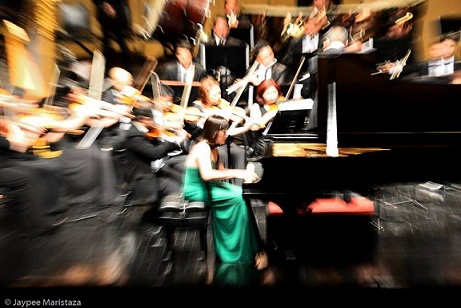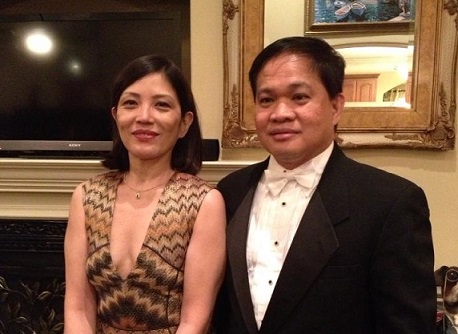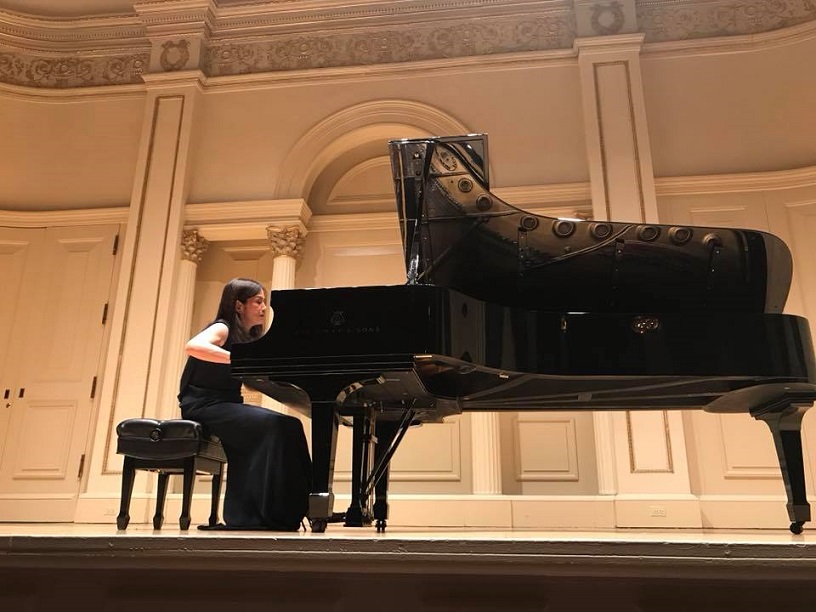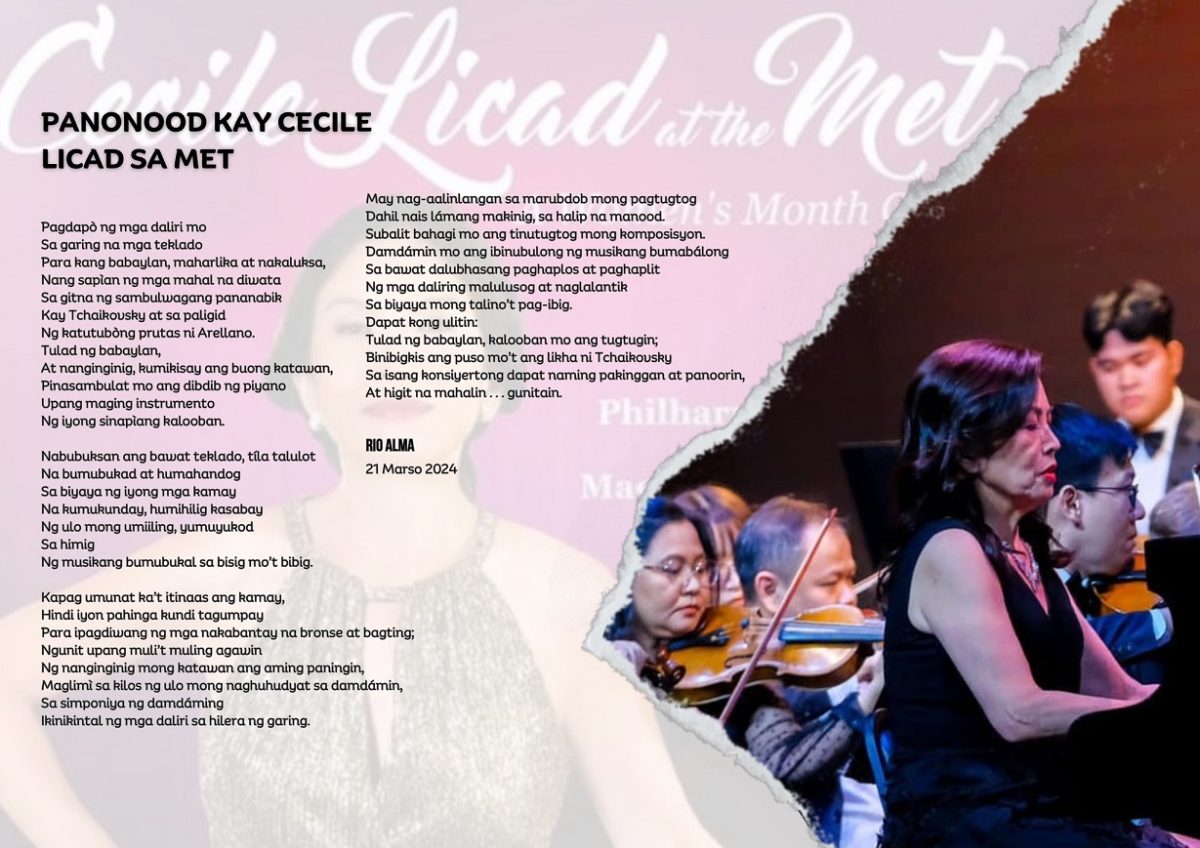By PABLO A. TARIMAN
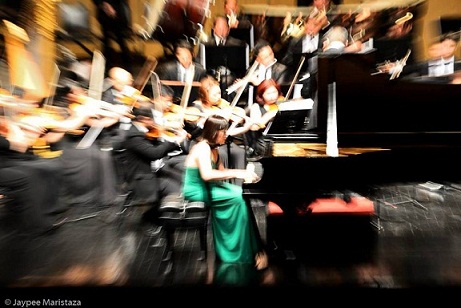
LISZT’S Piano Concerto No. 1 and Totentanz (Dance of Death) are obviously not the ideal ingredients for surefire box office success of any classical concert.
Whether we like it or not, Filipinos love Chopin, Rachmaninoff, Tchaikovsky (not exactly in that order) but Liszt’s Dance of Death for a finale? Chopin’s Sonata No. 2 (the Funeral Sonata) at least has melodic lines enough to wipe out its association with the agony of death.
Add to that Typhoon Signal No. 2 raised by the weather bureau you have a perfect formula for a concert not likely to be patronized on this rainy night.
But last night, the country’s leading pianist, Cecile Licad, once again showed her almost hair-raising interpretative power by making something supremely beautiful and profound about Liszt’s intimation of death.
After a suspenseful fifteen minutes of an unfamiliar but powerful reading of the Liszt Totentanz, Licad and the ABS CBN Philharmonic under Gerard Salonga got a rousing standing ovation from an audience who defied typhoon Signal No. 2 to watch their national treasure.
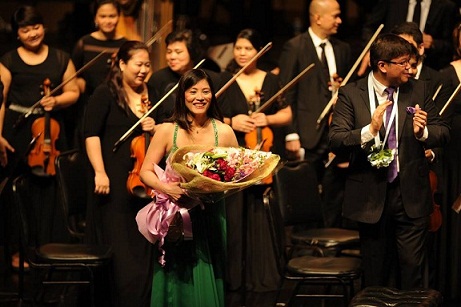
“It is always worth my time flying from Bacolod to Manila to hear Licad,” said 67-year old businessman Ricky Silverio from Negros. “She is such a joy to watch and she always has something for her audience that I can treasure with me before I die.”
Comelec lawyer Pam Herrera who came with artist Pablo Baen Santos exulted: “Licad’s fingers can touch the keys as hard as a rock, as soft as the gentlest breeze, and as fluid as water all at the same time. Unarguably, she is one of the best pianists who has ever graced this earth. For a brief moment, I forgot about how I was painfully struggling the past days. And an ultimate truth dawned on me: Sorrow could be drowned in the light of great music.”
Writer Gemma Corotan Kolb was so overwhelmed by the performance she commented on face book after arriving home on a rainy Saturday night: “God played the piano tonight.”
Artist-columnist Marivic Rufino gushed on FB: “Happiness is being in a concert of Cecile Licad. It was our international superstar pianist at her best!”
Also in the audience was the pianist’s patron, former first lady Imelda Marcos and her daughter, Irene Marcos Araneta who lent the Steinway grand which was a wedding gift for her by American piano icon, Van Cliburn who passed away in March this year.
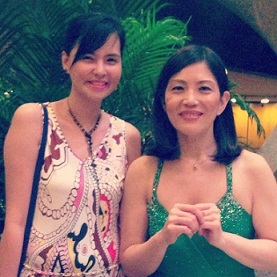
Conductor Gerard Salonga who earlier teamed up with Licad in Saint-Saens No. 2, De Falla’s Nights in the Garden of Spain, Chopin’s Andante Spianato and Tchaikovsky’s Concerto No. 1 — said that in his recent performance with Licad, he felt a magic he’d never felt before.
The conductor has learned to make it a point to accept challenge every time he is faced by a new and difficult repertoire.
And it isn’t just the music. “The whole situation of being in an unfamiliar hall was a challenge. I cannot stress enough the value of rehearsal, a dedicated and talented orchestra, and a soloist who brings the very best out in everyone who collaborates with her.”
As in his past collaboration with Licad, Salonga pointed out there was nothing like getting new musical ideas from the master herself.
“I felt this time that she was even more open to sharing her ideas. One that sticks out is the idea of exploring musical ideas that you’re not used to. It can be scary and unsafe. Too many people like to stay in their comfort zone and not lay it all on the line. She takes the gamble, and taught me that doing that in an effort to communicate something makes it all worth it,” he related.
Salonga said another lesson he learned from Licad is to keep even often played pieces fresh. “She constantly imparts that if you’ll be playing something you’ve already played before, learn it from scratch and discover it all over again.”
And that freshness Salonga saw in the pianist’s interpretation of Totentanz.
He quipped: “As a jazz lover, how can I not love it when she says ‘Let’s get some jazz in there.’ And boy she really loves to rehearse, as I do. Her openness to new ideas is so wonderful. She’s willing to give anything a try if it’s going to help communicate the feelings of the composer. Our relationship is at a point where we can be very honest with each other, and no time is wasted trying to be nice. She accepts what we (the orchestra) try to give her in an effort to inspire her or trigger an idea, and she throws that ball right back! This took place in both rehearsal and performance.”
Salonga said it is very difficult to compare this recent concert with his past engagements. “But I think the magnitude of the whole thing – a classical debut of the orchestra on the CCP stage and with a soloist like her– will make it stand out in my memory.”
